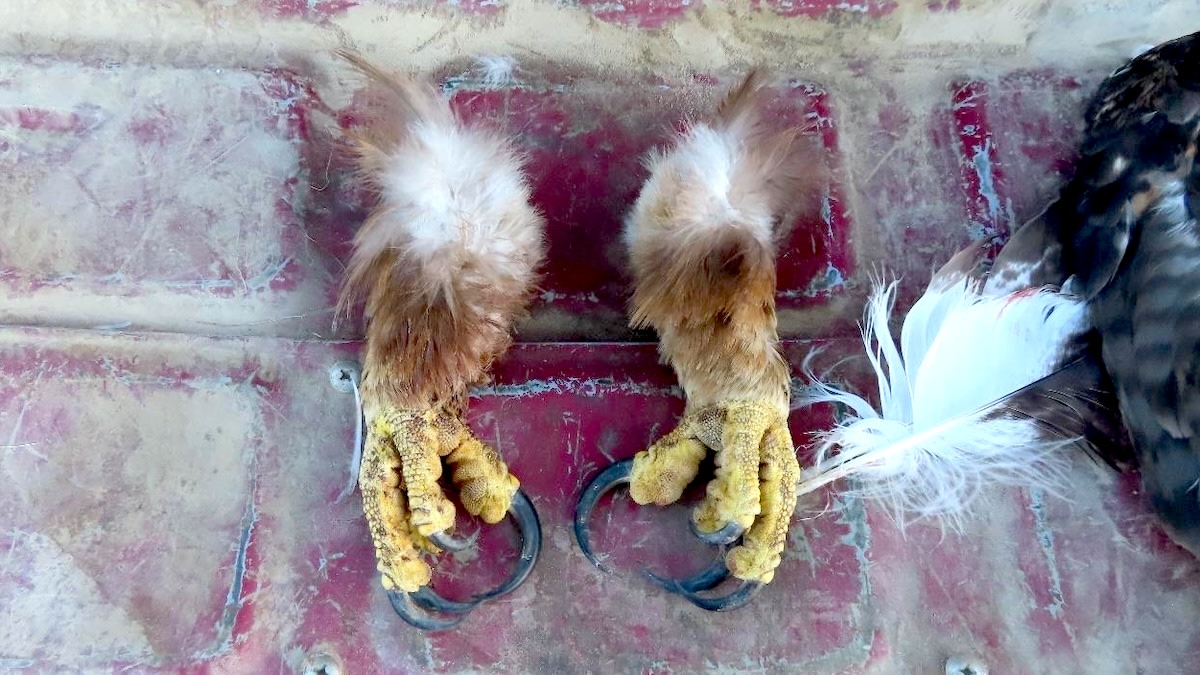Washington Man Gets 4 Years in Federal Prison for Eagle Hunting

A Washington State man will spend nearly four years in federal lockup and be forced to pay hundreds of thousands of dollars in fines and restitution for hunting bald and golden eagles and selling their feathers on the black market.
Travis John Branson, 49, of Cusick, Washington, pleaded guilty in March to conspiracy, two counts of unlawful trafficking of bald and golden eagles, and violation of the Lacey Act. Last week, Judge Dana L. Christensen of the U.S. District of Montana sentenced him to three years and 10 months in prison, to be followed by three years of supervised release, and ordered him to pay $777,250 restitution.
“Branson went on self-described ‘killing sprees’ for thousands of eagles and hawks, butchered them, and sold the parts and feathers for profit on the black market. He knew he was committing felonies and even joked his cost to kill them was the price of a bullet,” U.S. Attorney Jesse Laslovich said. “But his conduct was no laughing matter. With today’s sentence, the cost to Branson was more than a bunch of bullets—he forfeited the very freedom the bald eagle symbolizes.”
Court documents allege that 118 eagles and 107 hawks can be traced directly back to Branson, and that he, at one point, killed nine eagles in one trip. Officials say that between 2009 and 2021, he made between $180,000 and $360,000 by selling eagle feathers and parts for profit on the black market.
But he wasn’t alone. Another man named Simon Paul helped Branson with his illegal hunts, and Branson, Paul, and others are believed to have killed 3,600 birds during a conspiracy that lasted between 2015 and 2021. Branson would travel from Washington to the Flathead Reservation, where he would meet Paul, and the pair would shoot, transport, and ship bald and golden eagles for future black-market sales.
Paul was indicted for crimes similar to Branson’s back in December of 2023, but he did not appear for his arraignment and remains a fugitive, according to the Department of Justice.

Branson’s prison sentence is part of a larger effort by the federal government to crack down on eagle poaching rings that seek to profit from the rising demand for eagle feathers used in Native American ceremonies.
The demand is driven in part by individual buyers just looking for home decor, but also by tribal members who don’t want to wait for a government program that distributes feathers for free, according to the Associated Press. These feathers are used in everything from high school graduations to marriages to funerals, but the federal program is facing a yearslong backlog, and many tribal members need them sooner.
According to the original indictment, Branson and Paul would lure eagles using dead deer as bait. They would also target young golden eagles for their highly valued white and black wing feathers, and one of Branson’s texts specifically mentions wanting to shoot a baby eagle.
The Department of Justice press release cites several other texts that demonstrate Branson’s clear knowledge of the illegality of his actions.
While negotiating a purchase price for eagle feathers with a potential buyer, Branson said, “I don’t get em for free though ..out hear committing felonies”
He told another potential buyer he would obtain other eagle tails by “[g]oing on a killing spree” and admitted to another that shipping the feathers internationally is illegal but “..I just get em for 99 cents ..price of a bullet..lol.”
“The unlawful killing of these majestic birds violates federal law and is a profound offense against our nation's cherished natural heritage,” said Edward Grace, Assistant Director of the U.S. Fish and Wildlife Service Office of Law Enforcement. “Travis Branson's blatant disregard for the law and the sanctity of these protected species highlights the urgent need for stringent enforcement and greater public awareness regarding wildlife trafficking.”
The U.S. Congress passed the Bald and Golden Eagle Protection Act in 1940, which prohibits anyone, without a permit issued by the Secretary of the Interior, from “taking” bald or golden eagles, including their parts (including feathers), nests, or eggs.
Images via U.S. Attorney's Office, District of Montana.


